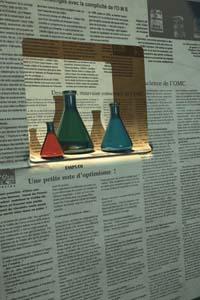Little commitment to science communication at the seminar on science communication
2009/11/20 Carton Virto, Eider - Elhuyar Zientzia
Misunderstanding between journalists and scientists is a recurring theme in all conferences, congresses and seminars on scientific communication, and Wednesday was no exception. Arguments are known. Journalists permeate news related to science, health, the environment, simplicity, sensationalism. They want titles, round statements. And science cannot offer it. They are scientific questions, doubts, total insecurity, complexity... However, journalists urgently need opinions, assessments and scientists need time to read, understand and contrast information. In addition, they are full of work, they don't have much time to offer communications. And yes, communication is important, but it is not recognized by superiors or colleagues. And then the journalist will put in his mouth words that the scientist has not said...
As we have said, the debate is classic and also arguments. And they are not a lie. The media has a great capacity to influence society and, as they perceive a question, different tendencies can emerge. Or it can become a priority issue without so much scientific or medical relevance. And also deform. As a last example we have influenza A, but in the seminar we discussed other paradigmatic cases such as the vaccine against cervical cancer.
The seminar emphasized the need for qualified scientific journalists to deal well with documentation, to understand what counts and its context. Indeed. But not only that.
In addition to scientific journalists, we need communication scientists who say "that's not so" to the excesses or lies of scientific news. Those who will take the word, who will not give them any interest. It is hard work. Because it is much easier than scientific reasoning to open a lie, a sensationalist idea, a news with a touch of conspiracy, an alarm... To avoid repeating the flu A, there is the LHC accelerator, and the risk of creating a black hole that devours us all. This idea has been extended to bolo-bolo and the CERN has prepared a huge report to deny it and put in place the ghost of risk. And yet a group that has called itself ConCERNed (Committee on CERN Experimental Dangers) wants to denounce the LHC to the United Nations because it threatens life on Earth and therefore goes against human rights. Closer, in the Basque Country itself, Wi-Fi systems are now in conflict and we are hearing horrible problems.
Given these incredible situations, it is legitimate that scientists do not want to participate in the debate. It is exhausting and the media do not help too often. There is a tendency, for example, to think that the balance is 50%; to face a Wi-Fi and an expert in electromagnetic waves, to deny that climate change is occurring and another that does not deny it... whatever scientific consensus and credibility. But, just in case, scientists who provide a scientific vision are essential in the media. If not, it is festive. Those who always occupy space.
Of course, no one can be forced to participate, but we were in a seminar on scientific communication and we expected no less from the speakers. That was not the main message. They talked about the importance of the subject, but on too many occasions they threw the stone to the roof of others. But we don't want to fall into mere criticism either. The Elhuyar Foundation has been communicating science for over 30 years. We want to extend science and technology to all audiences and in all formats, critical and scientific thinking, and for so many years we have necessarily gone through this phase of debate. Among others, in the seminars organized annually by the Elhuyar Laboratory of Scientific Culture. And if we have learned something it has been the need for scientists and journalists. In Elhuyar we have opted for this model, with which we have a team of 20 people of journalists and scientists of study. They are scientific journalists or scientists who want to make a serious and committed scientific journalism. When concern and interest in scientific communication is booming, we can only express our joy and put our experience at the service of others.
*Eider Carton Director of the magazine Elhuyar Zientzia eta Teknologia

Gai honi buruzko eduki gehiago
Elhuyarrek garatutako teknologia





